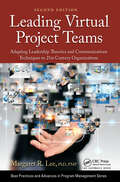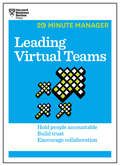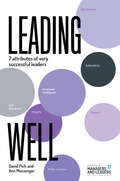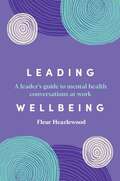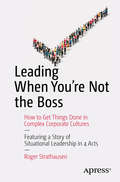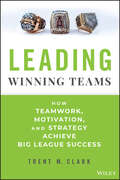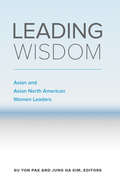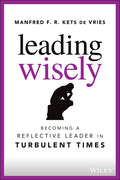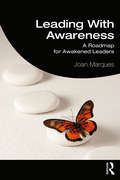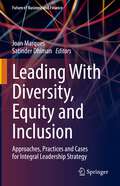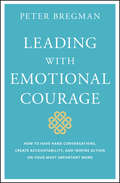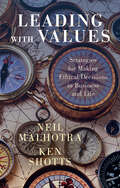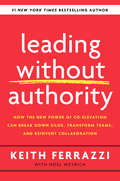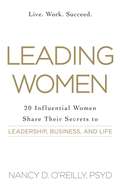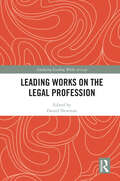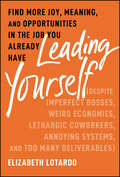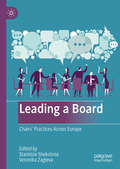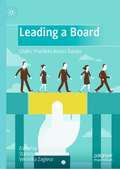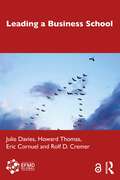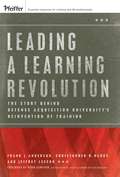- Table View
- List View
Leading Virtual Project Teams: Adapting Leadership Theories and Communications Techniques to 21st Century Organizations (Best Practices in Portfolio, Program, and Project Management #5)
by Margaret R. LeeThe second decade of the 21st century has brought unprecedented challenges to traditional workplaces. The global pandemic has forced the advance of working from home and telework. Individuals with little or no background or training in e-leadership, virtual project management, or virtual team management suddenly found themselves in the environment of virtual work. Leading Virtual Project Teams, Second Edition addresses the challenges that today’s virtual project management environment poses to traditional methods of leadership and communication. Leadership for successful virtual team management is different from that for traditional, collocated project team management. Explaining appropriate e-leadership styles for virtual project teams and the transition toward new leadership styles, the book is filled with communication techniques for leading virtual project teams. It helps project managers develop e-leadership competencies needed to successfully deliver projects in today’s organizations. The second edition also examines: Virtual meeting techniques Inclusive language Managing virtual relationships Why virtual work is now more important The work-at-home environment By recognizing how virtual teams are different from traditional teams, those managing virtual projects may be able to offer benefits to their organization by providing positive, successful leadership and exceptional communications, resulting in better project deliverables and products. This book provides an approach that explores all facets of e-leadership—from how traditional leadership theories and models can be applied by 21st century leaders to providing methods by which the virtual project manager can enhance virtual project communications to meet the needs of our modern global business world. It features project management checklists and templates and includes business cases, best practices, and tools and techniques for virtual project management communications.
Leading Virtual Teams (HBR 20-Minute Manager Series)
by Harvard Business ReviewLeading any team involves managing people, technical oversight, and project administration, but leaders of virtual teams perform these functions from afar. Leading Virtual Teams walks you through the basics of: Connecting your people to each other-and to the team's mission Surmounting language, distance, and technology barriers Identifying and using the right communication channelsDon't have much time? Get up to speed fast on the most essential business skills with HBR's 20-Minute Manager series. Whether you need a crash course or a brief refresher, each book in the series is a concise, practical primer that will help you brush up on a key management topic. Advice you can quickly read and apply, for ambitious professionals and aspiring executives-from the most trusted source in business. Also available as an ebook.
Leading Well: 7 attributes of very successful leaders
by David Pich Ann MessengerLeading Well is about the inspiration of leadership. It focuses squarely on the personal attributes that can transform managers into leaders and good leaders into great leaders.For this - the second book in its Leadership Series - the Institute of Managers and Leaders asked its membership of more than 10,000 which were the most important personal attributes for leadership success. The top 7 attributes selected are explored in detail in this book.Respect, integrity, emotional intelligence, ability to inspire, authenticity, self-awareness and decisiveness lie at the very heart of the ability for a leader to lead well. These attributes are presented in each of the 7 chapters and each is supported by case studies, practical advice, real-life examples, strategies for improvement and interviews with some of today's top leaders. The result is a book that is useful, practical and inspiring. Leading Well isn't about leadership theory; it's about the practice of leadership. It's about leaders rolling up their sleeves and doing things differently to have an impact.
Leading Wellbeing: A Leader's Guide to Mental Health Conversations at Work
by Fleur HeazlewoodLeaders have the responsibility to provide a psychologically safe and well work environment for their teams. With levels of stress and burnout rising, and one in five people experiencing mental illness, mental health conversation skills are no longer a nice-to-have. Mental health conversation competence is a necessary part of our leadership toolkit.Our leaders also juggle the daily pressure of competing priorities, urgent deadlines and overwhelming workloads while worrying about their team' s wellbeing, and are at risk of developing chronic stress and burnout themselves.Many leaders feel ill-equipped, lacking the skills and training to have the difficult and supportive mental health conversations that are needed to support the wellbeing of their people. Leading Wellbeing addresses the key concerns for leaders and presents a clear framework to follow for recognising the signs someone is struggling, providing psychological safety, what to say, what support is appropriate and how to balance both care and performance needs.The Mental Health Mastery approach improves leader confidence, capability and capacity in having the necessary, difficult conversations at work.
Leading When You're Not the Boss
by Roger StrathausenAnswer the questions that arise when managers and workers need to adjust to unfamiliar leadership roles and rules in flattened organizational forms. Leading When You''re Not the Boss provides a conceptual framework that you can apply when assessing your own organizations and work. The book discusses the underlying ideas necessary for a shift from a culture of hierarchies to one of relationships and the establishment of intrapreneurial and holistic work environments. This book supports the trend in many corporations toward flattening parts of their traditional top-down hierarchical management systems into more egalitarian, democratized, and distributed organizational forms. It analyzes the weaknesses of "management" culture at a time of ever more rapid change and complexity in the business world and illustrates how flattened organizational units increase agility, innovation, and efficacy. Moreover, it discusses how individuals can exercise effective leadership despite lacking the command-and-control authority of conventional bosses and ways for organizations to cultivate effective "post-management" cultures. Especially in the technology sector, large projects have become too complex to be mastered by any single leader. Drawing on his experience as a senior manager and executive consultant for a number of Fortune Global 500 companies, Roger Strathausen analyzes the situations and benefits that motivate companies to adopt flattened organizational forms. He shows that empowering a multi-talented group to manage itself by horizontal cooperation can deliver products with more speed, efficiency, innovation, and nimbleness than a solo boss could, while yielding higher employee productivity and retention rates. With an entertaining mix of real-world examples and an episodic HBR-style fictitious case study, the author illustrates throughout the book how his leadership lessons can be serviceable only when intelligently tailored to the dynamic complexities of specific situations, including the personalities and competencies of the people involved. What you''ll learn How traditional hierarchical structures inhibit agile, creative responses to the complexities of today''s business world How to tailor the techniques of shared leadership to specific business situations rather than treating them as iron rules How to flourish in nonhierarchical and ambiguously-hierarchical organizational contexts that encourage individual initiative for the joint benefit of the enterprise and personal professional growth How success and fulfillment at work are enhanced by organizational forms in which participants assess the situational relevance of their respective talents and actively apply them to group objectives in lateral cooperation with peers, as opposed to passively receiving orders from appointed bosses Who this book is for The primary readerships for this book are business leaders and managers at all levels in corporations and non-managerial professionals who work in self-directed teams. The secondary readerships are practitioners, consultants, and academics interested in the topics of human resources, organizational design, and the future of work. Table of Contents Change, As Planned and As Happens: A Plea for Human Values Leader, Know Thyself Management Unplugged: Modulating to a Post-Management Key Alpha Dogs Let Talent Lead! Fostering Situational Leadership within Self-Organizing Teams Lateral Leadership Guiding Lost Giants: A Post-Management Strategy for Adapting Jobs to Talents Why Are We Here? Conclusion
Leading Winning Teams: How Teamwork, Motivation, and Strategy Achieve Big League Success
by Trent M. ClarkBuild a team of winners by transforming adversity into achievement In Leading Winning Teams: How Teamwork, Motivation, and Strategy Achieve Big League Success, the CEO of the famed coaching organization Leadershipity, Trent Clark, translates the lessons he learned on the way to becoming a three-time World Series coach in three Major League Baseball Organizations to life outside of the elite sporting arena. In the book, you’ll find insights and stories from over 20 high-profile athletes and coaches who explain what it takes to succeed both on and off the field. You’ll be inspired as you discover the challenges and setbacks these all-time greats and dynamic leaders had to overcome to realize their dreams and how you can apply the same strategies they used to build the future – and the team – you’ve always wanted. Explore the common thread that connects seemingly unconnected people from across the athletic world and find out how they consistently performed at the peak of their respective disciplines. Also discover: How to build a team of 1%’ers, people who regularly out-perform 99% of their peers Actionable strategies to improve your leadership, motivation, and teamwork, as well as those same skills in the people who follow you Techniques to create high-quality teams and organizations that achieve things you never thought possible The learning and adaptation to apply new information, stay agile in dynamic environments, and navigate changing market conditions Face setbacks and tough competition fostering resilience and a competitive mindset making you invaluable in leadership roles within organizations, and pursue goals with unwavering determination, contributing to a culture of achievement and success Packed with stories, anecdotes, and interviews from world-leading personalities, athletes, and coaches, Leading Winning Teams explains how you can transform setbacks, challenges, and adversity into the building blocks of true greatness.
Leading Wisdom: Asian And Asian North American Women Leaders
by Su Yon Pak Jung Ha KimDiscussions about leadership, even those centered on women, often overlook contributions made by Asian and Asian North American women. Now, Su Yon Pak and Jung Ha Kim share stories of Asian and Asian North American women who found their ways, sometimes circuitously, sometimes unexpectedly, into leadership roles. <P><P>Divided into three sections—“Remembering Wisdom,” Unsettling Wisdom,” and “Inciting Wisdom”—the book presents narratives of leadership experiences in the fields of social activism, parish ministry, teaching, U.S. Army chaplaincy, religious history, Christian denominational work, theology, nonprofit organization, theological social ethics, clinical spiritual care education in healthcare systems, and community organizing. <P><P>Leading Wisdom challenges conventional understanding through its creative reimagining of what it means to lead.
Leading Wisely: Becoming a Reflective Leader in Turbulent Times
by Manfred F. Kets de VriesDiscover true leadership with this actionable guide from a world renowned leadership expert, psychoanalyst, and executive coach In Leading Wisely: Becoming a Reflective Leader in Turbulent Times, renowned leadership expert, psychoanalyst and executive coach Manfred Kets De Vries delivers an insightful and unique exploration of what it means to lead with wisdom. The book demonstrates that exclusive reliance on knowledge, data, and information yields a superficial leadership style lacking in depth and discernment. What's more important in the wisdom equation is possessing humility, judgment, empathy, compassion, and night vision. With eleven chapters full of anecdotes and tales from a variety of spiritual and cultural traditions that enrich and lend a deeper significance to the choices we make as leaders and members of organizations, Leading Wisely provides readers with: A thorough exploration of dealing with negative—but entirely natural motivations, like envy and greed An emphasis on the Golden Rule—treating others as we like to be treated ourselves An opportunity to be courageous—to consciously and intentionally pick our battles, saving energy for what really matters Lessons on how to listen intently and actively, truly hearing what our colleagues, friends, family, and followers are saying before reacting Finding happiness within ourselves Leading Wisely: Becoming a Reflective Leader in Turbulent Times is a startlingly incisive book, filled with messages that make the book required reading for anyone in a position of leadership or power. It also belongs in the libraries of well-being and health practitioners who frequently deal with businesspeople as clients or patients.
Leading With Awareness: A Roadmap for Awakened Leaders
by Joan MarquesPresenting the essentials of awakened leadership through 50 contemplative branches, this text is a revolutionary yet sensible leadership manual that takes the reader from self-reflection to interaction, touching on internal and external factors that influence business decision-making. This book is designed to expand awareness within those who lead at present or those who aspire to lead. One can only lead others responsibly having understood how to lead the self, becoming an “awakened leader.” Awakened leaders stay true to their values but are very much aware that life and business are continuous processes of growth and change—an awareness more critical than ever in today’s VUCA world. Awakened leaders recognize that these constant changes are calls to regular reflection, enabling greater empathy, understanding, and ultimately, improved decision-making. Postgraduate students and practicing leaders in the workplace will value this book, which tells them in a straightforward way how to undertake no-nonsense action with a compassionate and visionary foundation.
Leading With Diversity, Equity and Inclusion: Approaches, Practices and Cases for Integral Leadership Strategy (Future of Business and Finance)
by Satinder Dhiman Joan MarquesThis book guides managers and leaders toward greater insight and more deliberate practices in regards to diversity, equity, and inclusion addressing leadership, operations, and the educational environments. The authors consider the qualities of awakened leadership as critical components for establishing and nurturing a diverse, equitable and inclusive work environment. The book argues that the only way destructive conflicts can be resolved on a lasting basis is through profound collaboration, which can be embedded in performance structures by questioning biases, and becoming aware of limiting mindsets and traditions, that keep parts of society subjugated. It offers a wide range of constructive approaches that lead to higher awareness, thus, better understanding and focus on stakeholders. Finally, it presents examples of diversity-engendered issues and their resolutions from around the globe.
Leading With Emotional Courage: How to Have Hard Conversations, Create Accountability, And Inspire Action On Your Most Important Work
by Peter BregmanThe Wall Street Journal bestselling author of 18 Minutes unlocks the secrets of highly successful leaders and pinpoints the missing ingredient that makes all the difference You have the opportunity to lead: to show up with confidence, connected to others, and committed to a purpose in a way that inspires others to follow. Maybe it’s in your workplace, or in your relationships, or simply in your own life. But great leadership—leadership that aligns teams, inspires action, and achieves results—is hard. And what makes it hard isn’t theoretical, it’s practical. It’s not about knowing what to say or do. It’s about whether you’re willing to experience the discomfort, risk, and uncertainty of saying or doing it. In other words, the most critical challenge of leadership is emotional courage. If you are willing to feel everything, you can do anything. Leading with Emotional Courage, based on the author’s popular blogs for Harvard Business Review, provides practical, real-world advice for building your emotional courage muscle. Each short, easy to read chapter details a distinct step in this emotional “workout,” giving you grounded advice for handling the difficult situations without sacrificing professional ground. By building the courage to say the necessary but difficult things, you become a stronger leader and leave the “should’ves” behind. Theoretically, leadership is straightforward, but how many people actually lead? The gap between theory and practice is huge. Emotional courage is what bridges that gap. It’s what sets great leaders apart from the rest. It gets results. It cuts through the distractions, the noise, and the politics to solve problems and get things done. This book is packed with actionable steps you can take to start building these skills now. Have the courage to speak up when others remain silent Be stable and grounded in the face of uncertainty Respond productively to opposition without getting distracted Weather others’ anger without shutting down or getting defensive Leading with Emotional Courage coaches you to build your emotional courage, exercise it effectively, and create an environment in which people around you take accountability to get hard things done.
Leading With Values: Strategies for Making Ethical Decisions in Business and Life
by Neil Malhotra Ken ShottsAs societies become more polarized, there is increasing pressure for business leaders to have a sense of purpose and to make moral decisions. Being a good leader requires both a keen understanding of the realities of human decision making as well as an analysis of what is right and wrong. This book integrates lessons from three intellectual traditions – psychology, philosophy, and political economy – to guide readers on a journey to rigorously explore their values and decision making. The authors begin by examining people's intuitions about right and wrong. They then clarify principles that embody these intuitions and help readers engage with others whose intuitions or principles differ from their own. Ultimately, this book teaches readers how to be strategic as they lead with their values: as individuals, as designers of organizations, and as businesspeople interacting with societal institutions.
Leading Without Authority: How the New Power of Co-Elevation Can Break Down Silos, Transform Teams, and Reinvent Collaboration
by Keith Ferrazzi Noel WeyrichThe #1 New York Times bestselling author of Never Eat Alone redefines collaboration with a radical new workplace operating system in which leadership no longer demands an office, an official title, or even a physical workplace. &“An actionable methodology for any team to thrive during the decade of exponential change ahead.&”—Peter H. Diamandis, founder of XPRIZE and Singularity University, bestselling co-author of Abundance, Bold, and The Future Is Faster Than You ThinkIn times of stress, we have a choice: we can retreat further into our isolated silos, or we can commit to &“going higher together.&” When external pressures are mounting, and employees are working from far-flung locations across the globe, says bestselling author Keith Ferrazzi, we can no longer afford to waste time navigating the complex chains of command or bureaucratic bottlenecks present in most companies. But when we choose the bold new methodology of co-elevation as our operating model, we unlock the potential to boost productivity, deepen commitment and engagement, and create a level of trust, mutual accountability, and purpose that exceeds what could have been accomplished under the status quo. And you don&’t need any formal authority to do it. You simply have to marshal a commitment to a shared mission and care about the success and development of others as much as you care about your own. Regardless of your title, position, or where or how you work, the ability to lead without authority is an essential workplace competency.Here, Ferrazzi draws on over a decade of research and over thirty years helping CEOs and senior leaders drive innovation and build high-performing teams to show how we can all turn our colleagues and partners into teammates and truly reboot the way we work together.
Leading Women
by Nancy D. O'ReillyNow is the time... Stop waiting around for the career--and life--that you deserve and start taking the reins! Leading Women shows you how to claim power and respect, conquer your internal barriers, and change the world by helping other women do the same. Featuring stories from twenty nationally acclaimed female leaders, this empowering guide offers real-life advice for breaking free of the predetermined roles in the business world and life. Powerful women such as New York Times bestselling author Marci Shimoff, advocacy leader Gloria Feldt, and Emmy-winning television host Aurea McGarry describe what it's like to go beyond their comfort zones, hold their own in a male-dominated environment, and take control of the situations that keep many women from achieving their goals. From corporate coach Lois Frankel's key ways to becoming a natural and necessary leader to bestselling author M. Bridget Cook-Burch's struggles after years of abuse, their insight will help you embrace your purpose, seize important opportunities, and overcome any obstacle that comes your way. With the guidance of these influential, resourceful leaders, you'll maximize your personal power, exceed your business goals, and establish a network designed to support and celebrate your fellow women.
Leading Women: 20 Influential Women Share Their Secrets to Leadership, Business, and Life
by Nancy D O'ReillyNow is the time...Stop waiting around for the career--and life--that you deserve and start taking the reins! Leading Women shows you how to claim power and respect, conquer your internal barriers, and change the world by helping other women do the same. Featuring stories from twenty nationally acclaimed female leaders, this empowering guide offers real-life advice for breaking free of the predetermined roles in the business world and life. Powerful women such as New York Times bestselling author Marci Shimoff, advocacy leader Gloria Feldt, and Emmy-winning television host Aurea McGarry describe what it's like to go beyond their comfort zones, hold their own in a male-dominated environment, and take control of the situations that keep many women from achieving their goals. From corporate coach Lois Frankel's key ways to becoming a natural and necessary leader to bestselling author M. Bridget Cook-Burch's struggles after years of abuse, their insight will help you embrace your purpose, seize important opportunities, and overcome any obstacle that comes your way.With the guidance of these influential, resourceful leaders, you'll maximize your personal power, exceed your business goals, and establish a network designed to support and celebrate your fellow women.Contributors include: Kristin Andress, Cheryl Benton, Claire Damken Brown, PhD, M. Bridget Cook-Burch, Vivian Diller, PhD, Gloria Feldt, Lois P. Frankel, PhD, Joanna L. Krotz, Aurea McGarry, Lisa Mininni, Shirley Osbourne, Lois Phillips, PhD, Birute Regine, PhD, Linda Rendleman, Marcia Reynolds, PhD, Marci Shimoff, Rebecca Tinsley, Sandra Ford Walston, Michele Willens, and Janet Rose Wojtalik, EdD
Leading Women: 20 Influential Women Share Their Secrets to Leadership, Business, and Life
by Nancy D O'ReillyNow is the time...Stop waiting around for the career--and life--that you deserve and start taking the reins! Leading Women shows you how to claim power and respect, conquer your internal barriers, and change the world by helping other women do the same. Featuring stories from twenty nationally acclaimed female leaders, this empowering guide offers real-life advice for breaking free of the predetermined roles in the business world and life. Powerful women such as New York Times bestselling author Marci Shimoff, advocacy leader Gloria Feldt, and Emmy-winning television host Aurea McGarry describe what it's like to go beyond their comfort zones, hold their own in a male-dominated environment, and take control of the situations that keep many women from achieving their goals. From corporate coach Lois Frankel's key ways to becoming a natural and necessary leader to bestselling author M. Bridget Cook-Burch's struggles after years of abuse, their insight will help you embrace your purpose, seize important opportunities, and overcome any obstacle that comes your way.With the guidance of these influential, resourceful leaders, you'll maximize your personal power, exceed your business goals, and establish a network designed to support and celebrate your fellow women.Contributors include: Kristin Andress, Cheryl Benton, Claire Damken Brown, PhD, M. Bridget Cook-Burch, Vivian Diller, PhD, Gloria Feldt, Lois P. Frankel, PhD, Joanna L. Krotz, Aurea McGarry, Lisa Mininni, Shirley Osbourne, Lois Phillips, PhD, Birute Regine, PhD, Linda Rendleman, Marcia Reynolds, PhD, Marci Shimoff, Rebecca Tinsley, Sandra Ford Walston, Michele Willens, and Janet Rose Wojtalik, EdD
Leading Women: 20 Influential Women Share Their Secrets to Leadership, Business, and Life
by Nancy D O'ReillyNow is the time...Stop waiting around for the career--and life--that you deserve and start taking the reins! Leading Women shows you how to claim power and respect, conquer your internal barriers, and change the world by helping other women do the same. Featuring stories from twenty nationally acclaimed female leaders, this empowering guide offers real-life advice for breaking free of the predetermined roles in the business world and life. Powerful women such as New York Times bestselling author Marci Shimoff, advocacy leader Gloria Feldt, and Emmy-winning television host Aurea McGarry describe what it's like to go beyond their comfort zones, hold their own in a male-dominated environment, and take control of the situations that keep many women from achieving their goals. From corporate coach Lois Frankel's key ways to becoming a natural and necessary leader to bestselling author M. Bridget Cook-Burch's struggles after years of abuse, their insight will help you embrace your purpose, seize important opportunities, and overcome any obstacle that comes your way.With the guidance of these influential, resourceful leaders, you'll maximize your personal power, exceed your business goals, and establish a network designed to support and celebrate your fellow women.Contributors include: Kristin Andress, Cheryl Benton, Claire Damken Brown, PhD, M. Bridget Cook-Burch, Vivian Diller, PhD, Gloria Feldt, Lois P. Frankel, PhD, Joanna L. Krotz, Aurea McGarry, Lisa Mininni, Shirley Osbourne, Lois Phillips, PhD, Birute Regine, PhD, Linda Rendleman, Marcia Reynolds, PhD, Marci Shimoff, Rebecca Tinsley, Sandra Ford Walston, Michele Willens, and Janet Rose Wojtalik, EdD
Leading Works in Legal Ethics (Analysing Leading Works in Law)
by Julian WebbThis volume reviews and takes stock of legal ethics, at a time when the legal profession globally is experiencing considerable change and challenges, through a re-evaluation of writings that are in some way foundational to the field. Legal ethics, understood here as the study of the ethics and professional regulation of lawyers, has emerged as a novel and important field of study over the last 50 years. It is also one that displays considerable diversity in its scholarship, with distinctive philosophical and interdisciplinary approaches emerging over the years to underpin and supplement the doctrinal ‘law on lawyering’. With contributions from leading and emerging scholars from the United States, Australia, Canada, the Netherlands, New Zealand and the United Kingdom, this collection offers not just critical insights into the authors’ chosen texts, but a thought-provoking commentary on the current state of legal ethics scholarship and its future directions. In addition to being an essential resource for scholars and students of legal ethics theory, it will also be of interest to academics and researchers in legal theory, the philosophy of law, and applied ethics.
Leading Works on the Legal Profession (Analysing Leading Works in Law)
by Daniel NewmanThis collection provides an innovative and engaging way of assessing the development of legal profession scholarship and its potential future development by presenting an analysis of the ‘leading works’ of the discipline. The book was written by prominent and emerging international scholars in the field, with each contributor having been invited to select and analyse a work which has for them shed light on what the legal profession is and what it does. The chapters explore the effect that the chosen work has had upon legal profession scholarship as a whole, both within particular jurisdictions and internationally. Contributors also reflect upon the likely implications of the leading work on the future study of and application to the legal profession. They relate the works to recent and contemporary developments in law and access to justice, such as the rise of technology, impact of the Covid-19 pandemic, and issues of funding, to highlight the interpretative value of such scholarship. Presenting an overview and introduction to the field of legal profession research, the collection will be required reading for researchers looking to study any aspect of the legal profession. It will also prove compelling for a wide variety of access to justice and justice system research projects. The book will also appeal to scholars interested in legal ethics.
Leading Yourself: Find More Joy, Meaning, and Opportunities in the Job You Already Have (Despite Imperfect Bosses, Weird Economies, Lethargic Coworkers, Annoying Systems, and Too Many Deliverables)
by Elizabeth LotardoCreate the work experience you want in the less-than-perfect job you already have. In Leading Yourself, celebrated workplace thought leader Elizabeth Lotardo delivers an engaging guide to owning and elevating your work experience. With tips, watchouts, and funny stories, Leading Yourself will give you the encouragement and tactics to up-level your career, even if you aren't in your dream job. You'll learn to manage your self-talk, find meaning in the mundane, optimize your time at work, and build relationships with the people who matter. Lotardo, a wildly popular LinkedIn Learning Instructor, shares key behaviors and habits that will transform the way you experience your job and unlock opportunities for career growth. You'll discover: Strategies to overcome self-doubt, embrace change, and navigate uncertainty Talk tracks for handling difficult bosses, like micromanagers, know-it-alls, and leaders who constantly change their mind How to avoid the awkwardness of giving and receiving feedback and what to do when the feedback is wrong Tips for preserving your own reputation when other people don't deliver (or if your company majorly messes up) Frameworks for evaluating and making your next career move Leading Yourself puts the power back in your hands. Even if you work for a fallible boss or imperfect organization, you can change the way you experience your job. An indispensable guide to self-leadership for aspiring and current managers, executives, directors, and other business leaders, Leading Yourself is the roadmap you've been waiting for.
Leading a Board: Chairs’ Practices Across Europe
by Stanislav Shekshnia Veronika ZagievaThis book represents the first cross-country study of the work of board chairs in Europe. It includes unique data collected through interviews with 90 experienced board chairs and their key stakeholders – board members, CEOs and shareholders.The book focuses on what board leaders actually do, rather than what they should do, and elaborates on a conceptual contingency framework for understanding chairs’ work in Europe. This includes a comprehensive list of chair practices – iterative behaviour strategies for getting things done, comparisons of contexts for chairs’ work and practices among nine countries, and identification of cross-European and country-specific trends that will shape the work of board leaders in the next decade.The book will benefit incumbent and future chairs, directors, shareholders, CEOs, executives and regulators in developing a systemic understanding of the work of a chair in the European business context and gaining insights into how the leader of the board deals with specific challenges. It will also be of use to educators to use as a platform for teaching corporate governance courses and developing specific programmes for board leaders. And finally, scholars will find rich conceptual and anthropological material for fostering their research in corporate governance, board and group effectiveness, stakeholder management, board leadership, and leadership in general.
Leading a Board: Chairs’ Practices Across Europe
by Stanislav Shekshnia Veronika ZagievaThis book represents the first cross-country study of the work of board chairs in Europe. It focuses on what board leaders actually do, rather than what they should do, and elaborates on a conceptual contingency framework for understanding chairs’ work in Europe. In this second edition, 18 experts from 14 European countries interviewed more than 300 chairs, CEOs, directors and shareholders to detect and compare specific practices and instruments that chairs use to deal with various challenges. Researchers also assessed the impact of the COVID-19 pandemic on the work of chairs and the boards they lead. The book benefits incumbent and future chairs, directors, shareholders, CEOs, executives and regulators in developing a systemic understanding of the work of a chair in the European business context and gaining insights into how the leader of the board deals with specific challenges.
Leading a Business School
by Howard Thomas Julie Davies Eric Cornuel Rolf D. CremerBusiness schools are critical players in higher education, educating current and future leaders to make a difference in the world. Yet we know surprisingly little about the leaders of business schools. Leading a Business School demystifies this complex and dynamic role, offering international insights into deans’ dilemmas in different contexts and situations. It highlights the importance of deans creating challenging and supportive learning cultures to enhance business and management education, organizations and society more broadly. Written by renowned experts on the role of the dean, Julie Davies, Howard Thomas, Eric Cornuel and Rolf D. Cremer, the book traces the historical evolution of the business school deanship, the current challenges and future sources of disruption. The leadership characteristics and styles of business school deans are presented based on an examination of different dimensions of their roles. These include issues of strategic positioning, such as financial viability, prestige, size, mission, age, location and programme portfolios, as well as the influences of rankings, sector accreditations, governance structures, networks and national policies on strategy implementation. Drawing on international case studies and deans’ development programmes globally, the authors explore constraints on deans’ autonomy, university and external relations, and how business school deans add value over the period of their tenures. This candid and well-researched book is essential reading for aspiring business school leaders, those hiring and working with deans, and other higher education leaders. The Open Access version of this book, available at http://www.taylorfrancis.com, has been made available under a Creative Commons Attribution-Non Commercial-No Derivatives (CC-BY-NC-ND) 4.0 license. Funded by EFMD Global.
Leading a Learning Revolution
by Anderson Hardy Christopher R. Frank J. Jeffrey LeesonLeading a Learning Revolution tells the compelling story of a learning revolution that took place within the U. S. Department of Defense. Written by practitioners who actually walked the walk, this account of the creation of Defense Acquisition University (DAU) provides a clear blueprint that others can follow. It shares, in detail, the best practices they developed, so that the thousands of training organizations worldwide striving to create premier corporate universities can catapult forward. Offering an insiderÕs look at the process, the authors clearly explain how they transformed an outdated training provider into a world-class university. Step-by-step the book outlines the enduring principles that were pivotal to Defense Acquisition UniversityÕs success and describes the environment, early victories, current methods, and subsequent results. The authors discuss how to establish a mission and vision, develop a performance-based strategic planning process, and tackle change initiative. They also explain the development and implementation of web-enabled learning architecture and reveal how to effectively measure and evaluate performance. In addition, the authors present strategies for assuring continual improvement and organizational growth. With this book, any organization can tap into DAUÕs best practices and winning strategies for improving corporate learning.
Leading a Surgical Revolution: The AO Foundation – Social Entrepreneurs in the Treatment of Bone Trauma
by Jean-Pierre JeannetThis book describes the 60-year history of the AO Foundation and its impact on the treatment of bone trauma. Originally founded by a group of Swiss surgeons, the AO has since established its osteosynthesis treatment approach to trauma, using surgery and implants, as the global standard. The AO successfully convinced the medical community that surgery of bone trauma was superior to the standard conservative treatment using plaster casts. This new technique meant that patients no longer had to spend long weeks at the hospital in traction, and prevented many disabilities. This book describes the struggle with the medical community, explains how the AO surgeons enlisted the support of an entire industry for their advanced tools and their research and teaching efforts, and details the AO’s evolution into a non-profit foundation that now trains more than 50,000 surgeons, on all continents, every year. The efforts of the AO’s affiliated surgeons, undertaken largely on a volunteer basis and with their own financial resources, serve as a stellar example of social entrepreneurship. Today the AO Foundation numbers over 20,000 surgeon members worldwide, and the industry that emerged to produce related implants and tools employs thousands of skilled staff. Professionals in consulting as well as in healthcare can use this book as a source of successful strategies, and as a blueprint for active social entrepreneurship.
